By CGTN America
The Justice Department on Wednesday appointed a special counsel to investigate accusations that President Trump’s administration coordinated with Russian officials. The position of a special counsel has been around in the United States since 1875.
They have played an important role in keeping checks on the government, investigating cases including the Whisky Ring, Teapot Dome, Watergate, Iran-Contra, and the Monica Lewinsky scandals. Here’s more about special counsels and what they are tasked to do.
Why has a special counsel been appointed?
Deputy Attorney General Rod J. Rosenstein said it was “in the public interest” to exercise his authority to appoint the position to former FBI Director Robert S. Mueller III.
Mueller will take over the current FBI investigation of Russian government efforts to influence the 2016 presidential election and related matters, Rosenstein said.
“My decision is not a finding that crimes have been committed or that any prosecution is warranted,” he said. “What I have determined is that based upon the unique circumstances, the public interest requires me to place this investigation under the authority of a person who exercises a degree of independence from the normal chain of command.”
Rosenstein said he had “great confidence” in the integrity of the the FBI to investigate the case, due to the “unique circumstances of this matter,” determined that a special counsel was necessary for people to have full confidence in the outcome.
“Our nation is grounded on the rule of law, and the public must be assured that government officials administer the law fairly. Special Counsel Mueller will have all appropriate resources to conduct a thorough and complete investigation, and I am confident that he will follow the facts, apply the law and reach a just result,” he said.
Who is Robert Mueller?
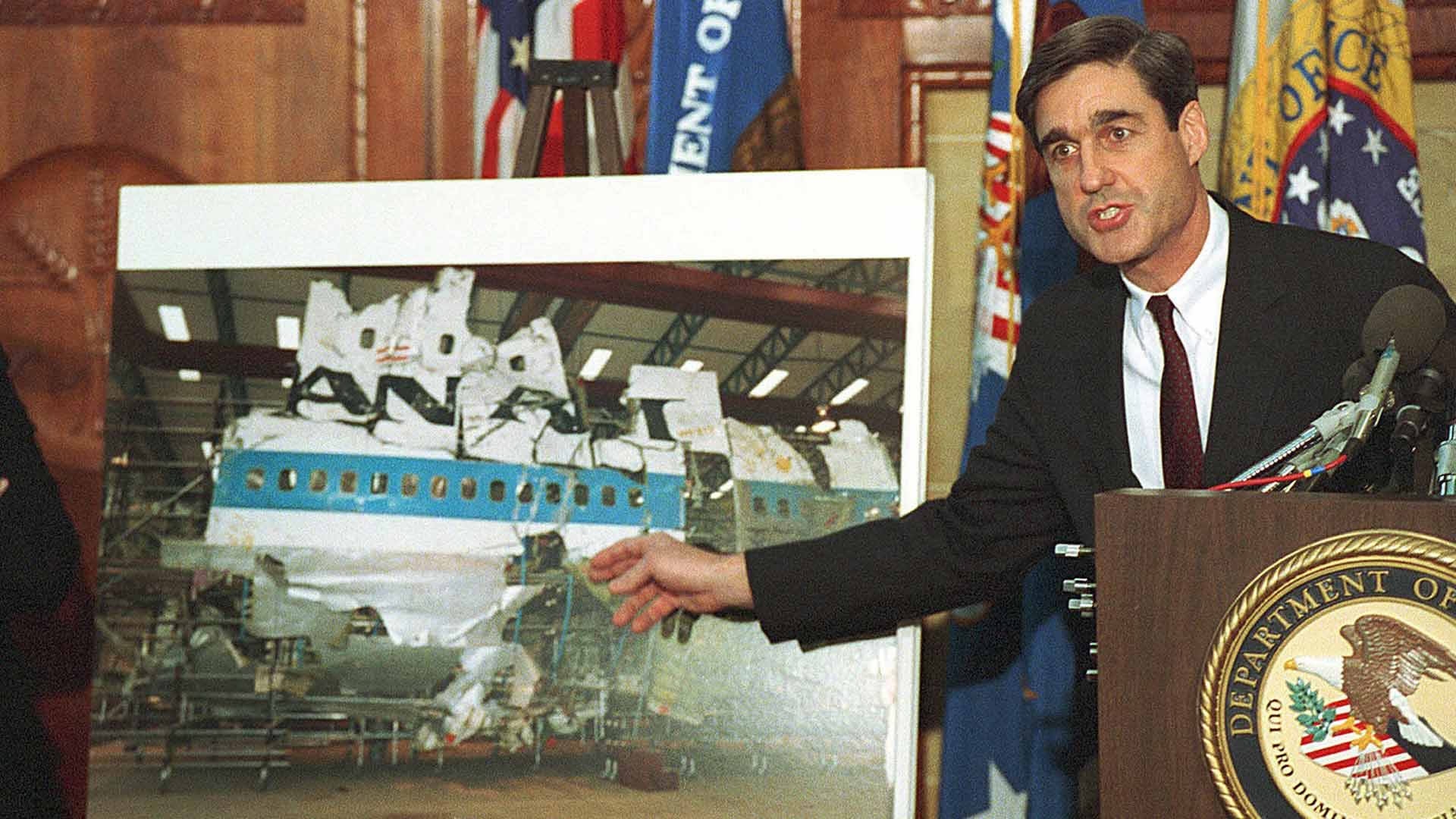
Nov. 14, 1991: Assistant Attorney General Robert Mueller points to a photo of the reconstructed wreckage of Pan Am Flight 103, which exploded over Lockerbie Scotland in 1988, killing 270 people. /AP Photo
Lawmakers on both sides of the aisle consider Mueller to be an impartial investigator. He is seasoned law enforcement veteran who guided the FBI through the aftermath of the Sept. 11 attacks and led its terror-fighting efforts over the next decade, the Associated Press reported
He served as the sixth director of the FBI from 2001-2013, nominated by President George W. Bush. He also served under President Barack Obama who asked him to stay for two more years beyond the typical 10-year-term for an FBI director. He was the longest-serving director of the FBI since J. Edgar Hoover.
Prior to the FBI, he was a federal prosecutor for both Republican and Democratic administrations in San Francisco, Boston, and the District of Columbia. He has investigated and prosecuted major financial fraud, terrorist, and public corruption cases, as well as narcotics conspiracies and international money launderers, according to the FBI website.
Mueller has also spent time in private practice as a partner for the law firm Hill and Barlow in Boston, and later as a partner in Boston’s Hale and Door firm, specializing in white collar crime litigation.
He is a graduate of Princeton University and has a master’s in international relations from New York University. He also served in the U.S. Marine Corps in the Vietnam War where he received the Bronze Star, two Navy Commendation Medals, the Purple Heart, and the Vietnamese Cross of Gallantry. After his service, he earned a law degree from the University of Virginia.
After leaving the FBI, Mueller became a partner at the law firm WilmerHale. After his appointment as special prosecutor on Wednesday, Mueller resigned his position at the private firm to avoid any conflicts of interest with firm clients or attorneys.
What’s the difference between special counsel, special prosecutor, independent counsel?
Nothing. The positions all describe the same person — someone who has been appointed to investigate wrongdoing when there is a potential conflict of interest by the existing investigative authority. In the past, only the president had the authority to call for a special counsel. Since 1999, the Justice Department instituted procedural regulations allowing the attorney general to appoint special counsels.
“Special prosecutor” was a term used for the position in the Watergate scandal, and “independent counsel” was used from 1983-1999 under the Ethics in Government Act. Since that act expired, the term “special counsel” has been used.
The position should not be confused with the U.S. Office of Special Counsel which is an independent federal agency that helps federal employees who face punishment for being whistleblowers.
What is Mueller investigating?
Rosenstein’s order to appoint Mueller authorizes him to investigate:
1. Any links and/or coordination between the Russian government and individuals associated with the campaign of President Donald Trump.
2. Any matters that arose or may arise directly from the investigation.
3. Any other matters within the scope of the Code of Federal Regulations on the General Powers of Special Counsel.
If Mueller believes it necessary, he is authorized to prosecute federal crimes arising from his investigation.
The broad tasks mean that Mueller could investigate if Trump’s firing of FBI Director James Comey last week amounts to obstruction of the FBI’s investigation into possible Russia ties with the Trump administration.
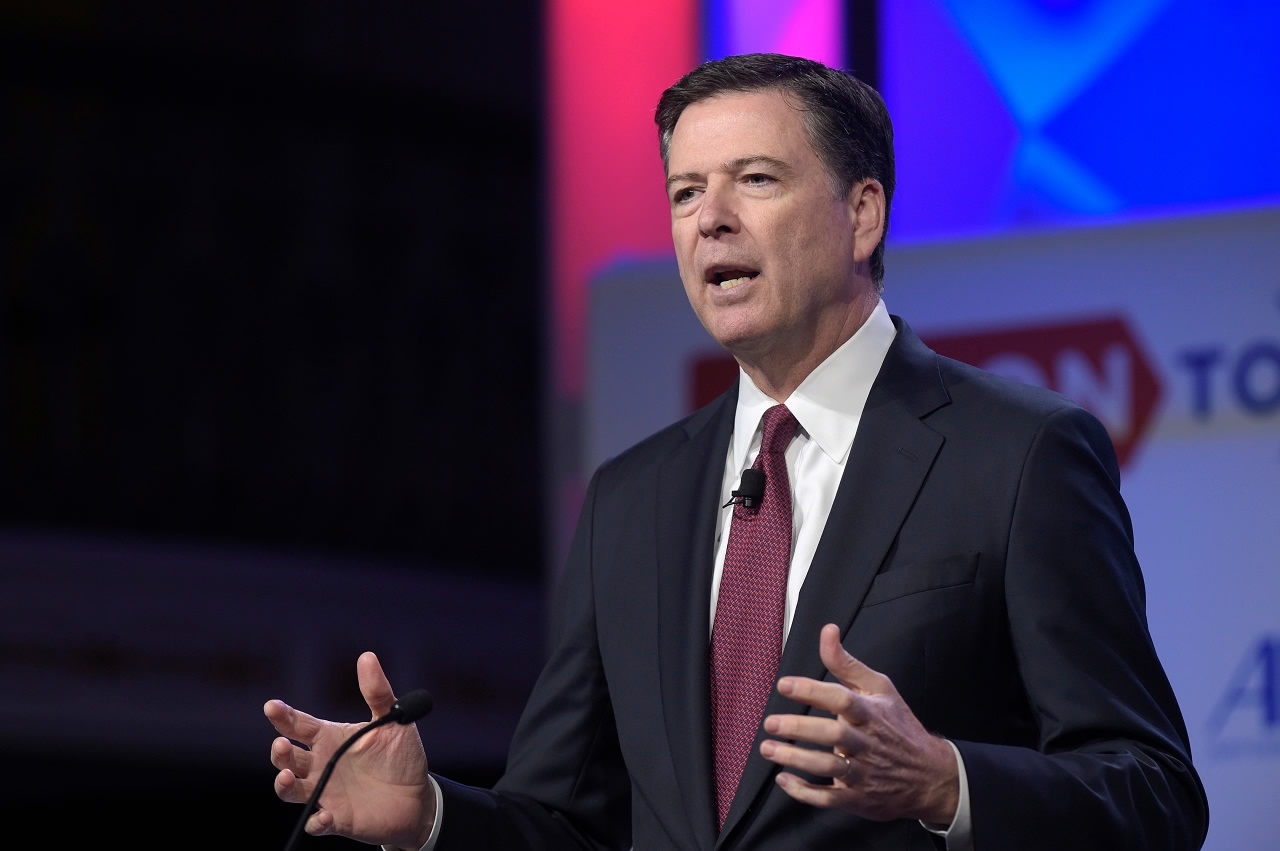
May 8, 2017: FBI Director James Comey speaks in Washington. President Donald Trump fired him the next day. /AP Photo
Mueller can also investigate if Trump attempted to interfere with the FBI’s investigation into former National Security Advisor Mike Flynn.
The New York Times reported this week that Comey had documented in a memo that Trump asked him to end the FBI’s investigation into Flynn during a February meeting. The White House denies this happened.
How long is a special counsel investigation?
There is no set timeline for these investigations. According to the law, the special counsel should provide a budget for the investigation within the first 60 days of his or her appointment that includes a request for personnel.
After that, 90 days before the start of each fiscal year, the special counsel should report to the attorney general the status of the investigation and provide a budget request for each year. The attorney general will determine if the investigation should continue. The special counsel must notify the attorney general of any significant events that happen during the investigation.
At the end of the investigation, the special counsel must provide the attorney general with a confidential report explaining whether he or she will prosecute or not prosecute anyone.
What is Trump’s response to the appointment of a special counsel?
Immediately following the announcement of Mueller’s appointment, Trump issued the following statement:
"As I have stated many times, a thorough investigation will confirm what we already know – there was no collusion between my campaign and any foreign entity. I look forward to this matter concluding quickly. In the meantime, I will never stop fighting for the people and the issues that matter most to the future of our country. "
Donald Trump
The next day he tweeted the following:
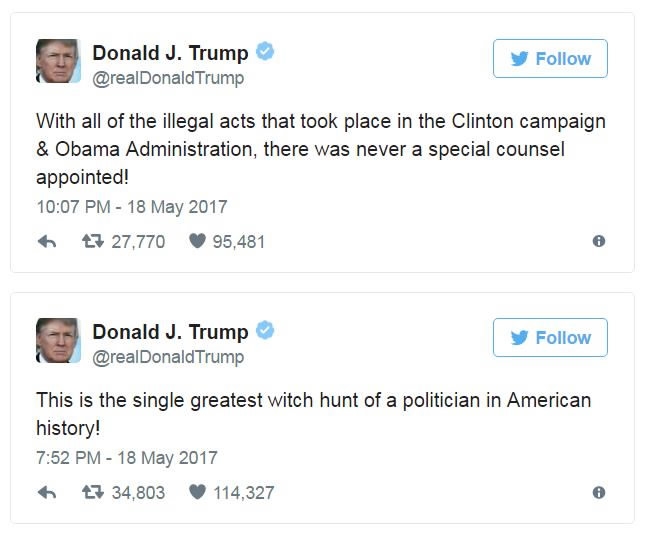
Twitter Screenshot
What are some well-known special counsel investigations?
Teapot Dome scandal
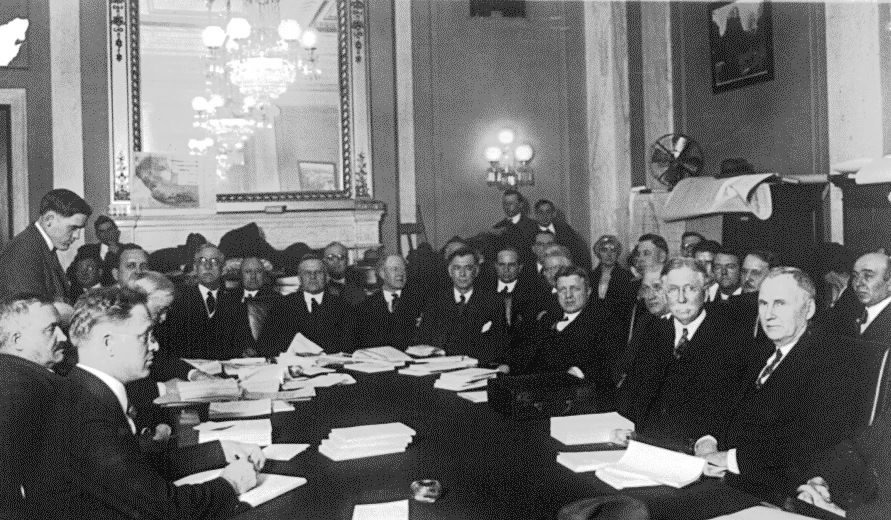
Oil businessman Edward L. Doheny (2nd L, at table) testifying before the Senate Committee investigating the Teapot Dome oil leases in 1924. /Web Photo
From 1921-22, President Warren G. Harding’s Interior Secretary Albert Bacon Fall leased federal petroleum reserves in Teapot Dome, Wyoming to private oil companies without competitive bidding, in exchange for bribes. Senator Thomas J. Walsh investigated the scandal and Fall was convicted and became the first member of the White House cabinet to go to jail for crimes committed in office.
Watergate
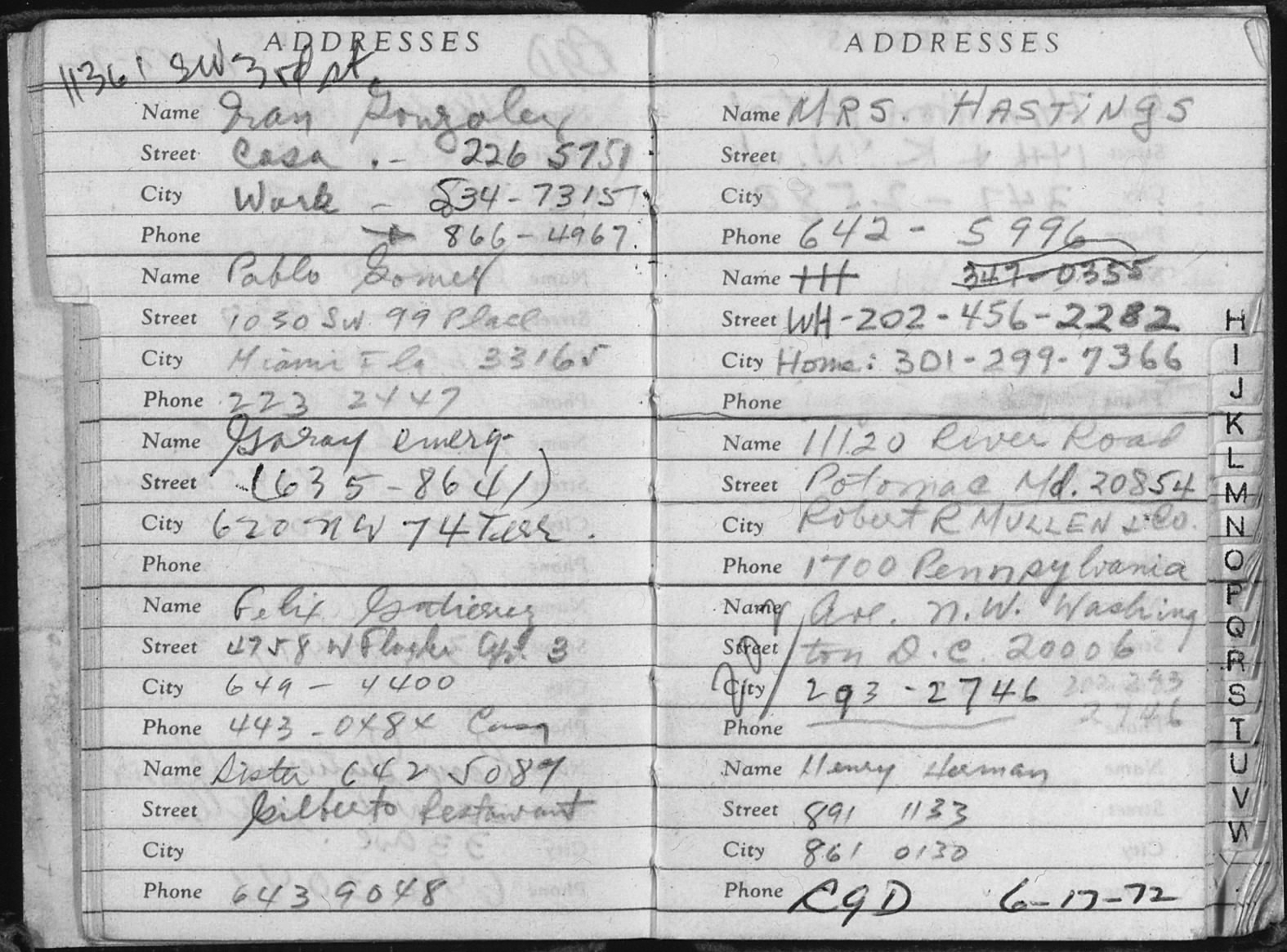
Address book of Watergate burglar Bernard Barker, discovered in a room at the Watergate Hotel, June 18, 1972. /Web Photo
In 1972, five men with connections to President Richard Nixon’s reelection campaign broke into the Democratic National Committee headquarters at the Watergate complex in Washington, DC. Following investigative reports from the Washington Post, Archibald Cox was appointed special prosecutor to investigate. Cox requested audio tapes Nixon made in the Oval Office, and Nixon refused to turn them over fired Cox. Attorney General Elliott Richardson and Deputy Attorney General William D. Ruckelshaus then resigned in protest. Nixon appointed Leon Jaworski as Cox’s replacement, who ultimately got the tapes through a Supreme Court ruling.
Iran Contra
In 1985, senior Reagan administration officials brokered the sale of arms to Iran — an act forbidden under an arms embargo — in order to fund U.S.-backed Contras in Nicaragua and negotiate the release of U.S. hostages in Iran. Independent counsel Lawrence Walsh was appointed to investigate. He found that weapons were illegally sold and 11 officials were convicted. The convictions were later overturned on appeal or the officials received presidential pardons, the Washington Post reported. No one served prison time.
Whitewater and Monica Lewinsky

Monica Lewinsky in 1997. /Web Photo
A 1994 special counsel investigation examined then President Bill Clinton and wife Hillary Clinton’s investment in a real estate deal by the Whitewater Development Corporation. Robert B. Fiske Jr., and later Kenneth W. Starr, served as special counsels. While the Clintons did not face charges, their business partners were convicted of fraud, the Washington Post reported. The investigation allowed the special counsel to examine Bill Clinton’s affair with then White House intern Monica Lewinsky, that led to his congressional impeachment and later acquittal.
Waco seige
In 1999, John C. Danforth served as special counsel to investigate allegations of government wrongdoing in the siege at the Branch Davidian compound in Waco, Texas, the Associated Press reported. That investigation included hundreds of interviews and a restaging of the final hours of the 51-day standoff with federal agents. Danforth ultimately produced a 150-page report clearing then Attorney General Janet Reno and other top government officials of any responsibility.
Valerie Plame CIA disclosure
In 2003, Patrick Fitzgerald served as special counsel to investigate if White House officials told journalists that Valerie Plame Wilson was a covert CIA agent. The investigation led to the indictment of Bush II administration official Lewis “Scooter” Libby. A jury convicted him of perjury, obstructing justice, and making false statements to investigators. He was sentenced to 30 months in prison, a $250,000 fine, and 400 hours of community service. Bush later commuted his prison sentence.









